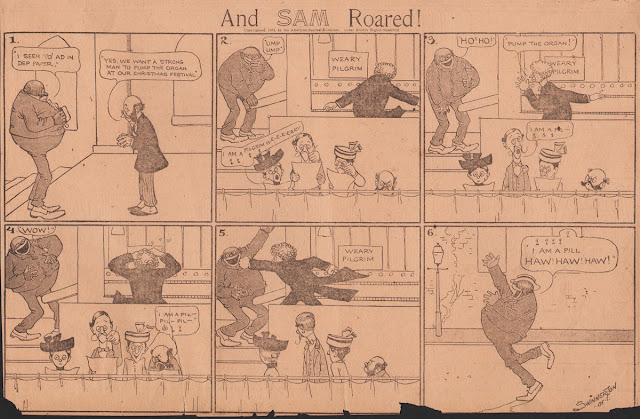Are comics art? I think so -- some comics, at least. The funny thing is that many comics creators (and I'm talking sequential narratives, here) appear to have been aware that their fellow humans regarded their hard work as innately inferior to the stuff that wound up on the walls in galleries. For many -- even today -- reading comics isn't actually reading -- and comics are associated with illiteracy and simple-mindedness. When someone wants to say something is shallow, they say it's "a comic book treatment." These commentators are only betraying their own ignorance -- for comics are an art form that combines words and image into a highly effective language that may be easy to grasp, but is anything but simple to create.
Many comics creators over the decades have used society's disapproval as grist for their mill. Here's a Rube Goldberg cartoon, circa 1915, in which he suggests the best way to view the new abstract and surreal art appearing in galleries and museums.
 |
| Rube Goldberg on modern art - circa 1915 (Photograph of original art) |
Milt Gross -- who in many ways is the direct artistic and screwball descendant of Goldberg -- also made sport of the idea of art many times. In a 1931 Count Screwloose Sunday page, Milt Gross dissects for us the mechanics behind the social value of art. In this case, a bum who attempts to get a drink in a bar by reciting a poem receives the comic blow of a pool table on the head. When the same bearded bohemian beggar appears at a society ball clad in his hospital sheet, the wealthy party-goers celebrate his "art." The entire absurd -- but all too true -- situation is witnessed by Count Screwloose:
 |
| Count Screwloose by Milt Gross - February 22, 1931 |
Abou Ben Adhem (may his tribe increase!)
Awoke one night from a deep dream of peace,
And saw, within the moonlight in his room,
Making it rich, and like a lily in bloom,
An angel writing in a book of gold:—
Exceeding peace had made Ben Adhem bold,
And to the presence in the room he said,
"What writest thou?"—The vision raised its head,
And with a look made of all sweet accord,
Answered, "The names of those who love the Lord."
"And is mine one?" said Abou. "Nay, not so,"
Replied the angel. Abou spoke more low,
But cheerly still; and said, "I pray thee, then,
Write me as one that loves his fellow men."
The angel wrote, and vanished. The next night
It came again with a great wakening light,
And showed the names whom love of God had blest,
And lo! Ben Adhem's name led all the rest.
Gross' inclusion of Hunt's poem, a chestnut by the 1930s, carries an ironic comment on the actions of his characters in the strip -- neither the pool hall ruffians not the society folks actually show any love at all for the beggar himself. Of course, as Sigmund Freud observed, nothing is less funny than analyses of jokes -- so I'll stop here and encourage my readers to simply dig those great, loose drawings in the strip above.
As to the issue of cartoons, art, and such -- I offer this from the great cartoonist Art Young (1866-1943):
"Some day painting will be glorified cartooning... The painter-cartoonist of the future will be an apostle of big ideas... That he will be an artist of pigment and form is, of course, important; but to be a thinking man of vision, helpfulness and courage, will be more important." (from On My Way by Art Young, 1928)
Artfully Yours,
Screwball Paul












